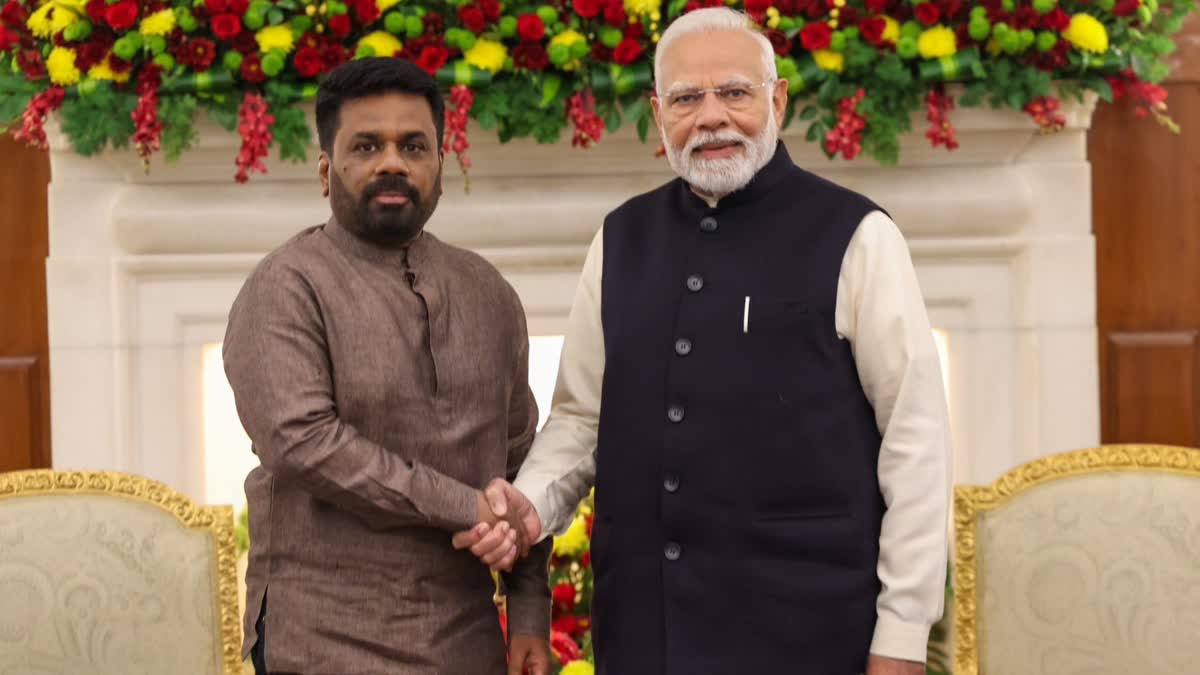New Delhi: In an important development, India and Sri Lanka on Monday agreed to take a humanitarian and livelihood-based approach to solve the fishermen dispute between the two countries arising out of competition for marine resources.
“Acknowledging the issues faced by fishermen on both sides and factoring the livelihood concerns, the leaders agreed on the need to continue to address these in a humanitarian manner,” a joint statement titled ‘Fostering Partnerships for a Shared Future’ issued following bilateral delegation-level talks headed by Prime Minister Narendra Modi and visiting Sri Lankan President Anura Kumara Dissanayake reads. “In this regard, they also underscored the need to take measures to avoid any aggressive behaviour or violence.”
According to the statement, both leaders expressed confidence that through dialogue and constructive engagements, a long lasting and mutually acceptable solution could be achieved.
“Given the special relationship between India and Sri Lanka, they instructed officials to continue their engagement to address these issues,” the statement further reads. “President Disanayaka thanked India for its initiatives for the sustainable and commercial development of fisheries in Sri Lanka, including development of Point Pedro Fishing Harbour, rehabilitation of Karainagar Boatyard and cooperation in aquaculture through Indian assistance.”
The fishermen dispute between India and Sri Lanka involves both ecological concerns and livelihood challenges, impacting the socio-economic and political relations between the two nations. There have been several incidents of Sri Lankan Navy personnel firing on Indian fishermen fishing in the Palk Strait, where India and Sri Lanka are separated by only 12 nautical miles (22 km). The issue started because of Indian fishermen having used mechanised trawlers, which Sri Lankan fishermen, including Tamils, claim deprives them of their catch and damages their fishing boats.
Indian and Sri Lankan fishermen historically shared access to these waters. The traditional fishing practices coexisted peacefully until the India-Sri Lanka Maritime Boundary Agreements of 1974 and 1976, which delineated maritime boundaries. As part of the agreement, India ceded Kachchativu Island to Sri Lanka but Indian fishermen were granted access to traditional fishing grounds near Kachchativu for “pilgrimage and drying nets”. However, over time, this access was curtailed.
The Tamil Nadu government and political parties frequently raise concerns about the plight of Indian fishermen. According to a statement issued by the Sri Lankan Navy earlier this month, this year alone 537 Indian fishermen were arrested for allegedly fishing in Sri Lankan waters.
The Sri Lankan government wants India to ban use of mechanised trawlers in the Palk Strait region, and negotiations on this subject are undergoing. Indian fishermen allegedly use bottom-trawling, a fishing method banned in Sri Lanka.
Bottom-trawling is a fishing method where heavy nets are dragged across the seabed to catch fish and other marine life. While it is an efficient means of harvesting large quantities of fish, it is widely criticised for its destructive impact on marine ecosystems. Sri Lanka views the entry of Indian fishermen into its waters as a violation of its sovereignty and maritime laws. Indian fishermen argue they are operating in traditional fishing grounds, creating a historical and legal contention.
India has introduced schemes to transition fishermen to sustainable practices, including deep-sea fishing. However, the uptake has been slow.
Briefing the media on Monday evening regarding the visit of President Dissanayake to India, his first bilateral visit after assuming office in September this year, Foreign Secretary Vikram Misri said that the issue of bottom-trawling came up for discussion during the meeting between Modi and Dissanayake.
“Sri Lanka’s approach has been that the bottom-trawling practice should not be used as it is harmful,” Misri said. “He (Dissanayake) said that this problem should be solved mutually by the two countries.”
In this connection, he also referred to the sixth meeting of the India-Sri Lanka Joint Working Group on Fisheries held in Colombo on October 29 this year
According to statement issued by the Indian High Commission in Colombo following that meeting, both sides agreed that the highest priority should be accorded to address the various issues faced by fishermen in a humanitarian manner as they pertain to livelihood concerns on both sides.
“They also agreed that only a humane, constructive and cooperative approach can create a durable basis for addressing the issues faced by fishermen on both sides,” the statement read. “The Indian side urged the Government of Sri Lanka for earliest release of Indian fishermen and their boats under Sri Lankan custody. Indian side also pointed out increase in detention of Indian fishermen and their boats in Sri Lankan custody, including imposition of long sentences and heavy fines, and stressed the need to uphold established understandings and modalities on issues related to fishermen.”
According to Misri, during the bilateral talks here on Monday, both Modi and Dissanayake agreed that the fishermen dispute should be seen as a problem for the common citizens.
“Both leaders agreed that this problem should be understood from the perspective of the backgrounds of the two countries,” the Foreign Secretary said. “As such, they were of the view that this problem should be solved through a humanitarian and livelihood-based approach. So, both nations will hold further discussions to solve this problem.”
Meanwhile, in what can be seen as a positive development, on the very day when Modi and Dissanayake were holding talks, Sri Lanka freed 18 Indian fishermen who had been detained.
“A group of 18 Indian fishermen have been repatriated safely,” the Indian High Commission posted on its X handle. “They will board from Colombo for Chennai in a short while.”



